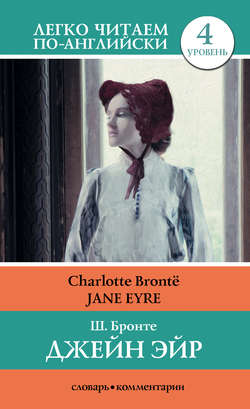Читать книгу Джейн Эйр / Jane Eyre - Шарлотта Бронте - Страница 11
Chapter 9
ОглавлениеBut the hardships of Lowood lessened. Spring came. The snows of winter melted. The nights and mornings were not so freezing cold any longer. First flowers started to appear amongst leaves. On Thursday afternoons we now took walks, and I realized that in spring the countryside around Lowood was beautiful. There was a clear stream nearby, and the school stood in the middle of a pretty wooded valley surrounded by high hills, purple with heather.
May followed April and brought days of blue skies and sunshine with it. All this beauty I enjoyed often and fully, free, unwatched, and almost alone. For this liberty and pleasure there was, however, an unpleasant cause.
Even though Lowood had a beautiful setting, it was not a healthy one. The nearby forest was full of for that crept into the school and breathed typhus through its crowded schoolroom and dormitory. Ere May arrived, our school was transformed into a hospital.
If we had all been strong and well-fed,[17] it wouldn’t have mattered so much. But, semi-starvation and neglected colds made forty-five girls ill at one time. Classes were broken up, rules relaxed. The teachers spent every moment looking after the ill or packing things of those who were fortunate enough to have friends and relatives and could leave Lowood at once. Many went home to die, some died at school and were buried quietly and quickly.
While the disease had become an inhabitant of Lowood, and death its frequent visitor, gardens glowed with flowers: lilies, roses and tulips were in bloom. Some of these lovely flowers ended up as a humble decoration for the coffins.
But I, and the rest who continued well, enjoyed the beauties of the scene and season. We walked in the wood from morning till night, we did what we liked, went where we liked: we lived better too.
Mr. Brocklehurst and his family never came near Lowood now driven away by the fear of infection. The servants and teachers were kinder to us. They gave us slices of pie, apples and parcels of bread and cheese to take out on our explorations.
I usually found a large, flat stone in the middle of the stream, where I had a picnic every day with my chosen friend Mary Ann. She was witty and original, and had a manner which set me at my ease. Some years older than I, she knew more of the world, and could tell me many things I liked to hear. She could tell stories well, I could analyse; she liked to inform, I liked to question, and we spent hours talking.
And where, meantime, was Helen Burns? Why did I not spend these sweet days of liberty with her? Had I forgotten her?
No doubt she was far better than Mary Ann, as the latter could only tell funny stories. But Helen was gravely ill. She was kept separately and Miss Temple took care of her personally. She had been taken to a room upstairs, and I saw her once in the garden with Miss Temple but was not allowed to speak with her. She did not have typhus, but an even more serious disease – consumption. How serious the disease was I learnt only later.
One evening, in the beginning of June, I had stayed out very late with Mary Ann in the wood. We had wandered so far that lost our way and it was only thanks to a man and woman, whose cottage we accidentally found that we found our way back. When we returned, we saw the doctor’s pony at the gate. Mary Ann went inside, and I stayed behind a few minutes to plant in my garden a handful of roots I had dug up in the forest. It was such a pleasant evening that I felt sorry for the sick who were lying in their beds now.
17
If we had all been strong and well-fed – если бы все мы были крепкими и сытыми
